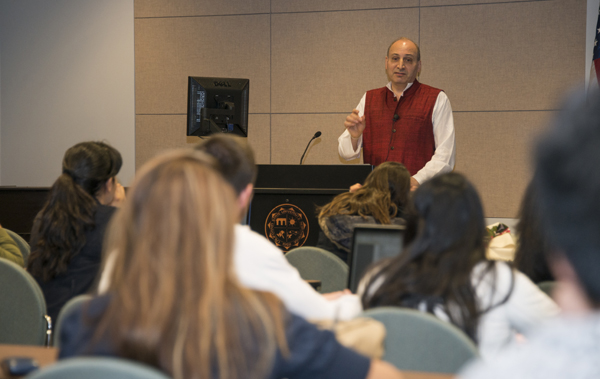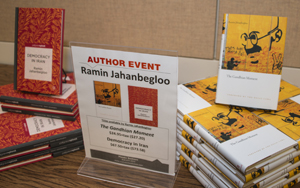CSUN Lecture Focuses on Nonviolence and Islam

Ramin Jahanbegloo, professor of Islamic studies at York University in Canada, spoke at a special event at California State University, Northridge on Nov. 19. He discussed nonviolence in the Islamic world, the root of his recent research. More than 120 attendees filled the lecture hall to listen to his exploration of the ancient city of Cordoba as a place in time when Jews, Christians and Muslims lived harmoniously. Photo by Lee Choo.
Internationally respected Iranian philosopher and academic Ramin Jahanbegloo, a professor of Islamic studies at York University in Canada, talked about “Nonviolence, Islam and the Paradigm of Cordoba” on Tuesday, Nov. 19, at California State University, Northridge.
The lecture attracted more than 120 CSUN community members, filling the Jack and Florence Ferman Room of the Delmar T. Oviatt Library.
Author of “The Gandhian Moment” and a scholar of philosophy, history and political science, Jahanbegloo was awarded the Peace Prize from the United Nations Association in Spain October of 2009 for his extensive academic work in promoting dialogue between cultures and advocacy for nonviolence. His CSUN presentation, hosted by the Middle Eastern and Islamic Studies Program, elaborated on a time when Muslims, Jews and Christians lived together peacefully and created a society known for its intellectual depth.

Some of Professor Jahanbegloo’s books were available for sale at his Nov. 19 author lecture at CSUN. Photo by Lee Choo.
“It is very important for Muslim youth to know that Islam does not have to be known through the Talibans and Al Qaeda; they are only one extremist version of Muslim identity and world view,” said Nayereh Tohidi, director of the Middle Eastern and Islamic Studies. “There have been and are many peaceful, pluralist and democratic-minded ordinary Muslims and also extra-ordinary elites and social thinkers such as Iqbal Lahori, Maulana Abul Kalam Azad, Ibn Sina (Avicenna), Ibn Rushd (Averroes), who, like Gandhi and Martin Luther King, advocated a non-violent, tolerant and rationalist path for social and political developments.”
Jahanbegloo noted that while recent events in the Middle East have stirred up a sometimes-acrimonious debate about Muslim societies and nonviolence, there was a time around the 10th century when the city of Cordoba, located in a southern region of Spain known as Andalusia, was known for its predominantly Muslim society that was tolerant of its Christian and Jewish minorities and had a reputation as the intellectual center of Europe.
“Some commentators in the West say the two — Middle East and peace — are not compatible,” he said. “The Cordoba experience is not the path which is taken by the radical followers of Islam today. They view modernity and democracy with suspicion, not only as a Western concept that threatens Muslim values but also as a sinister attempt by Western powers to dilute and weaken Islam.”
The Middle Eastern and Islamic Studies Program at California State University, Northridge is an interdisciplinary minor offering courses in the languages, histories, religions, cultures, sociology and politics of the Middle East. It seeks to enhance students’ understanding of Islamic cultures and the Muslim communities in the United States and internationally.
“One of the objectives of the MEIS program is educate our students and community at large about the diversity and complexity of other cultures, specifically Muslim majority societies internationally and the Muslim communities in the US, nationally,” said Tohidi. “We tend to hear a lot from the loud violent voices of extremists, but the voice of reason, non-violence and democracy are seldom heard from Muslim reformers and democratic, liberal and humanist philosophers and activists such as Dr. Ramin Jahanbegloo. [He] offered a dimension in the history of Islamic tradition that is little known by non-Muslims and even many Muslims, i.e, humanism and non-violence.”
On the basis of establishing peace among the three religions despite current turmoil, Jahanbegloo described how the experience of Cordoba could have an impact.
“The most notable and creative nature of the ‘Cordoba paradigm’ is that cohabitation and coexistence were based on religious and legal principles,” Jahanbegloo said. “This paradigm often refers to the interplay of intercultural discussion between the three groups and shared civic forum where different cultures and values could co-exist regardless of their ethnic or religious origins.”

 experience
experience